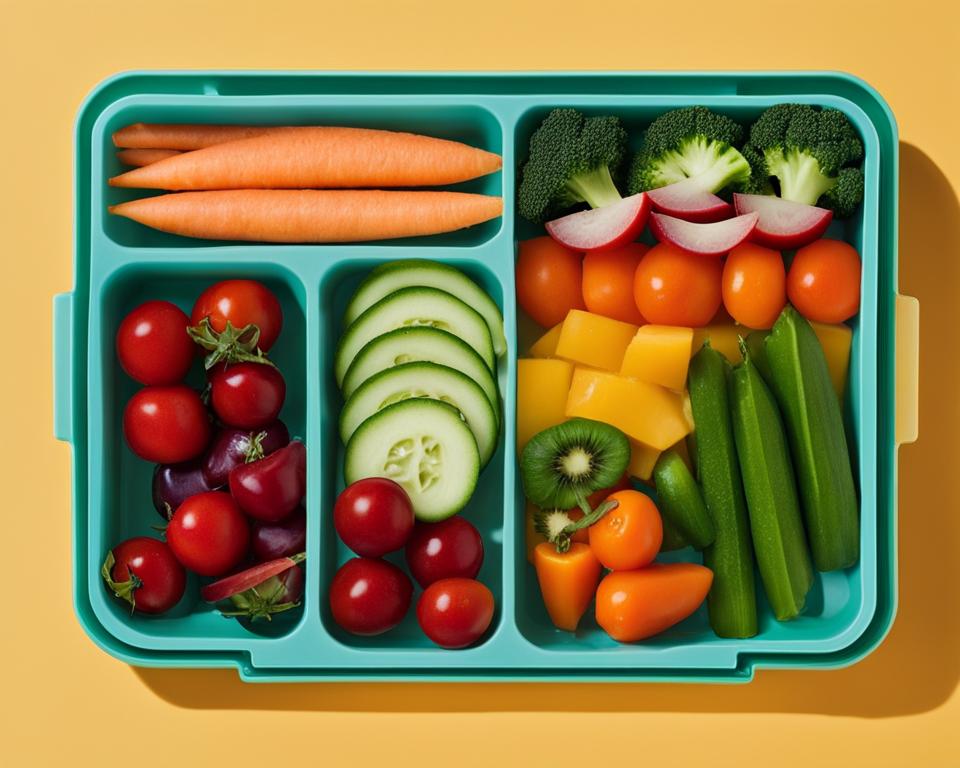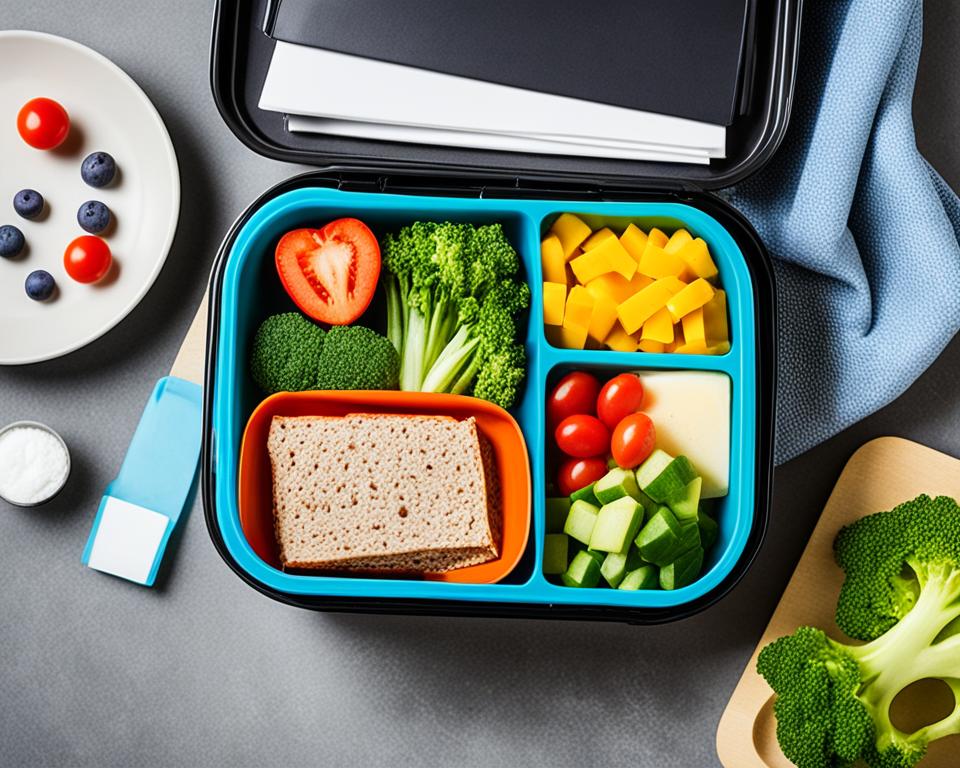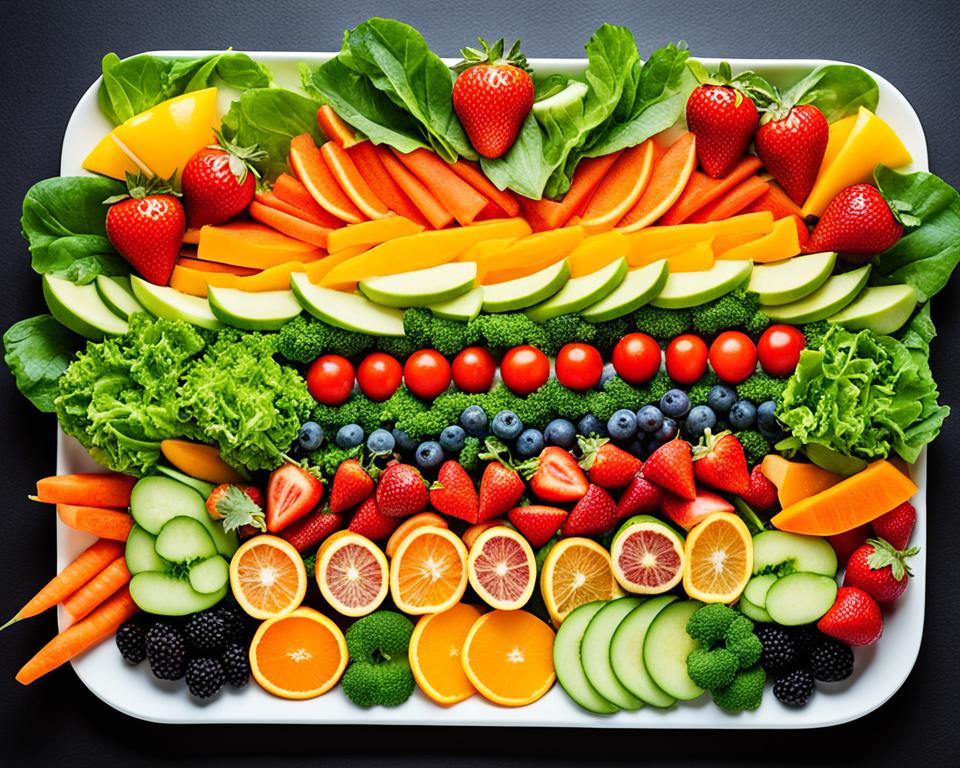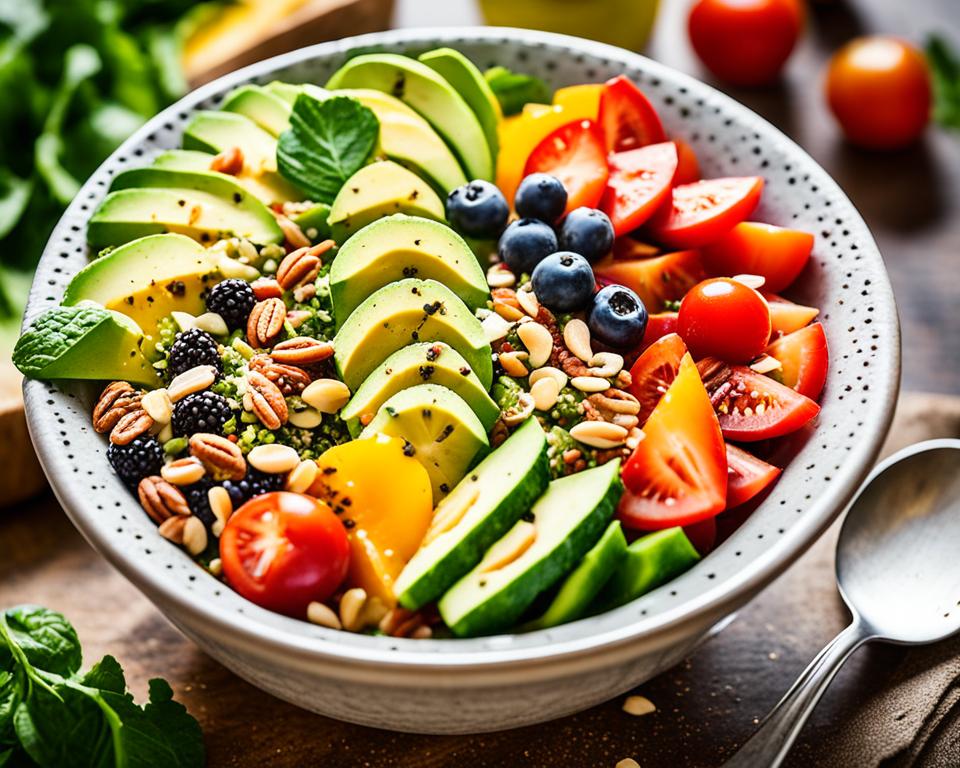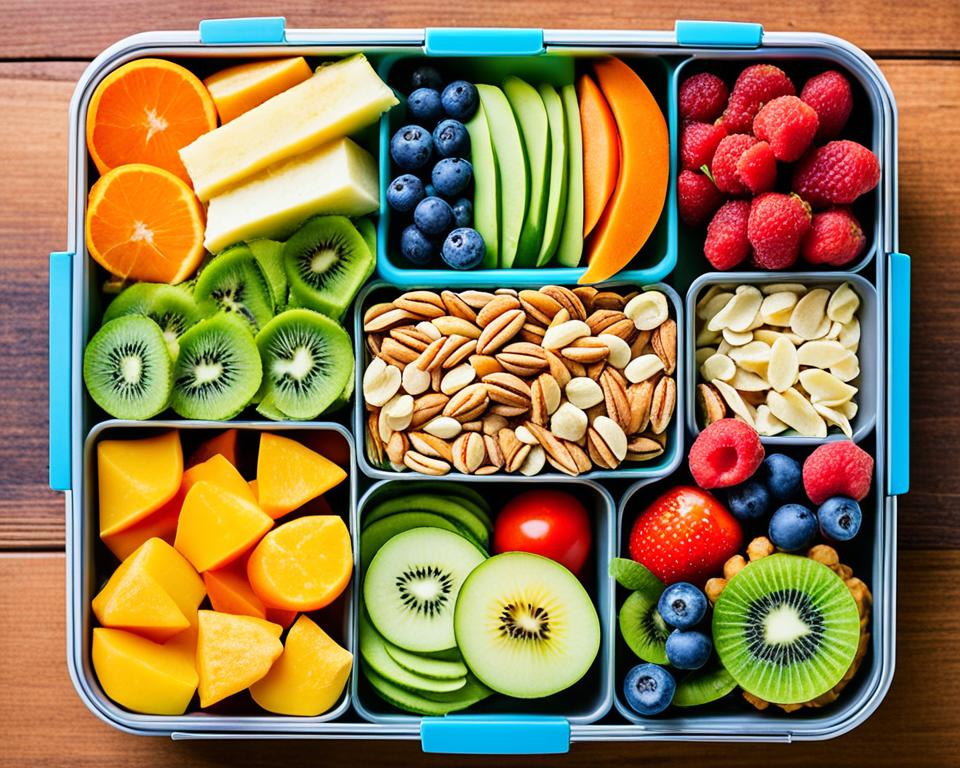Lunchtime is an important opportunity to nourish yourself and your growing baby with nutrient-rich meals. Choosing a balanced mix of lean protein, whole grains, produce, and healthy fats is key for a healthy pregnancy. Eating well during pregnancy can help support your baby’s development, reduce pregnancy symptoms, and promote a smoother postpartum recovery.
Key Takeaways:
- Choose a balanced mix of lean protein, whole grains, produce, and healthy fats for a healthy pregnancy.
- Eating well during pregnancy can support your baby’s development and reduce pregnancy symptoms.
- Include salads, soups, sandwiches, and smoothie bowls in your lunch options for nutritious meals.
- Stay hydrated by drinking at least 10 glasses of water per day to reduce bloating and prevent bladder infections.
- Create a healthy pregnancy meal plan and consider meal prepping for convenience and healthier eating habits.
The Importance of Lunch During Pregnancy
Making the most of your midday meal is crucial during pregnancy. Lunch provides an opportunity to fuel your body and provide essential nutrients for your baby’s development. It also offers a moment of calm and relaxation in your busy day. A well-balanced lunch can help ensure a healthy birth weight, improved brain development, and a lower risk of certain birth defects. Additionally, eating well during pregnancy can minimize pregnancy symptoms, such as morning sickness and mood swings, and promote a timely delivery and faster postpartum recovery.
The Benefits of a Well-Balanced Lunch During Pregnancy
- Ensures a healthy birth weight: Proper nutrition during pregnancy is essential for your baby’s growth. A well-balanced lunch provides the necessary nutrients to support healthy weight gain and development.
- Improves brain development: Nutrient-rich foods consumed during lunchtime can positively impact your baby’s cognitive abilities and brain development.
- Reduces the risk of birth defects: Certain nutrients, such as folic acid, iron, and calcium, play a crucial role in preventing birth defects. A nutritious lunch that includes foods rich in these nutrients can help lower the risk.
- Minimizes pregnancy symptoms: Eating well during pregnancy, including having a nourishing lunch, can help alleviate common discomforts like morning sickness, fatigue, and mood swings.
- Promotes a timely delivery and faster recovery: A healthy lunch packed with essential nutrients aids in proper fetal development and can contribute to a smoother labor and postpartum recovery.
“A well-balanced lunch during pregnancy is like a powerhouse of nutrients, providing your baby with the building blocks for growth and development while supporting your own well-being.”
| Nutrients | Food Sources |
|---|---|
| Protein | Lean meats, poultry, fish, eggs, legumes, tofu, Greek yogurt |
| Fiber | Whole grains, fruits, vegetables, beans, nuts, seeds |
| Folic Acid | Leafy greens, fortified grains, citrus fruits, beans, avocados |
| Iron | Lean red meat, poultry, beans, lentils, spinach, fortified cereals |
| Calcium | Dairy products, fortified plant-based milks, leafy greens |
| Omega-3 Fatty Acids | Fatty fish (salmon, trout), chia seeds, flaxseeds, walnuts |
Including these essential nutrients in your lunch can help ensure a well-rounded and nourishing meal for both you and your baby.
Nutritious Lunch Foods for Pregnant Women
When it comes to choosing what to eat for lunch during pregnancy, it’s important to opt for foods that are not only delicious but also packed with essential nutrients. A well-balanced and nutritious lunch can provide you and your baby the necessary energy and promote healthy fetal development. Here are some lunch options that are both nutrient-rich and satisfying:
1. Vibrant Salads:
Salads are a fantastic choice for a nutritious lunch. They are a great source of vitamins, minerals, and fiber, which are important for overall health and wellness during pregnancy. Include a variety of colorful vegetables, such as spinach, kale, bell peppers, carrots, and cherry tomatoes. Adding lean proteins like tuna, salmon, chicken, shrimp, beans, or lentils to your salad can further enhance its nutritional value.
2. Wholesome Soups:
Soups can provide warmth and comfort during your pregnancy journey. Opt for homemade soups made with nutrient-dense ingredients like vegetables, beans, lentils, and lean proteins. Vegetable soups, minestrone soups, and lentil soups are great choices that offer a balance of flavors and nutrients.
3. Nutrient-Packed Sandwiches:
Enjoy a sandwich made with whole grain bread and fillings that provide essential nutrients. Opt for lean proteins, such as grilled chicken or turkey breast, along with a variety of veggies like lettuce, cucumbers, and tomatoes. Adding avocado or hummus can provide healthy fats and extra flavor to your sandwich.
4. Protein and Calcium-Rich Smoothie Bowls:
Smoothie bowls are a tasty and refreshing option for a nutritious lunch. Blend together fruits, such as berries or tropical fruits, with Greek yogurt or almond milk for a creamy base. Top your smoothie bowl with sliced almonds, chia seeds, or granola for added protein and crunch.
Remember to prioritize food safety during pregnancy. Avoid Caesar dressing, undercooked eggs, lunch meats, certain fish high in mercury, and sugary yogurts. These precautions will help you ensure the safety and health of both you and your baby.
By making conscious choices when it comes to your lunchtime meals, you can maintain a well-balanced and nutritious diet throughout your pregnancy. Your lunch should provide you and your little one with the essential nutrients needed for a healthy and fulfilling pregnancy journey.
| Lunch Option | Nutritional Benefits |
|---|---|
| Vibrant Salads | Loaded with vitamins, minerals, and fiber from a variety of colorful vegetables. Lean proteins add extra nutritional value. |
| Wholesome Soups | Packed with nutrients from vegetables, beans, lentils, and protein. Warm and comforting. |
| Nutrient-Packed Sandwiches | Whole grain bread and lean proteins provide essential nutrients. Adding veggies and healthy fats boosts nutritional value. |
| Protein and Calcium-Rich Smoothie Bowls | A refreshing and flavorful option with fruits, Greek yogurt, and toppings that provide protein, calcium, and crunch. |
Tips for Healthy Pregnancy Lunches
During pregnancy, it’s important to prioritize your lunchtime meals to ensure you and your baby are getting the necessary nutrients. Here are some important tips to keep in mind:
- Fuel up with protein and fiber: Protein and fiber are essential for your overall health and keeping you feeling satisfied throughout the day. Include lean proteins such as grilled chicken, tofu, or legumes, along with fiber-rich foods like whole grains, fresh fruits, and vegetables.
- Focus on quality: Instead of counting calories or obsessing over specific nutrients, aim for quality in your meals. Choose whole foods that are minimally processed, such as fresh produce, lean meats, and whole grains. Avoid foods high in saturated fats and deep-fried items.
- Stay hydrated: Hydration is crucial during pregnancy. Drink at least 10 glasses of water per day, including a couple during lunchtime. Staying hydrated can help reduce bloating, flush out toxins, and prevent bladder infections.
Remember, lunch is just one part of your overall daily nutrition, so don’t feel pressured to fit every nutrient into one meal. Focus on making healthy choices and incorporating a variety of nutrient-rich foods into your entire day.
Expert Tip:
“Including a variety of colors on your plate not only makes your lunch visually appealing but also ensures you’re getting a wide range of nutrients. Aim for a rainbow of fruits and vegetables to maximize your nutrient intake.”
| Lunchtime Tips for Pregnant Women |
|---|
| 1. Prioritize lean proteins, such as grilled chicken or tofu. |
| 2. Include fiber-rich foods like whole grains, fresh fruits, and vegetables. |
| 3. Opt for whole, unprocessed foods to maximize nutrition. |
| 4. Avoid saturated fats and deep-fried items. |
| 5. Stay hydrated by drinking at least 10 glasses of water per day. |
Delicious and Nutritious Lunch Recipes for Pregnancy
Enjoy these simple, wholesome, and delicious recipes that are perfect for a nutritious lunch during pregnancy. From soups to sandwiches and salads, these recipes are packed with essential nutrients for you and your baby. Check out some mouthwatering options below:
Pumpkin Yogurt Parfait
- 1 cup plain Greek yogurt
- 1/4 cup pumpkin puree
- 1 tablespoon honey
- 1/4 cup granola
- Handful of berries
Instructions:
- In a bowl, mix Greek yogurt, pumpkin puree, and honey until well combined.
- In a glass or jar, layer the yogurt mixture, granola, and berries.
- Repeat the layers until all the ingredients are used.
- Finish with a sprinkle of granola and a few berries on top.
- Enjoy!
Scrambled Toast and Eggs
Ingredients:
- 2 slices whole-grain bread
- 2 eggs
- 1 tablespoon milk
- Salt and pepper to taste
- 1 tablespoon olive oil or butter
Instructions:
- In a bowl, whisk eggs, milk, salt, and pepper until well beaten.
- In a non-stick skillet, heat olive oil or butter over medium heat.
- Add the egg mixture to the skillet and cook, scrambling gently until fully cooked.
- Toast the bread and spread a thin layer of butter or avocado on each slice.
- Divide the scrambled eggs evenly between the slices of toast.
- Enjoy!
Chicken Quesadilla
Ingredients:
- 2 whole-wheat tortillas
- 1 cup cooked chicken breast, shredded
- 1/2 cup shredded cheese
- 1/4 cup diced bell pepper
- 1/4 cup diced onion
- 1/4 cup salsa
Instructions:
- Place one tortilla on a heated skillet or pan over medium heat.
- Sprinkle half of the shredded cheese evenly over the tortilla.
- Spread the cooked chicken, bell pepper, and onion on top of the cheese.
- Drizzle salsa over the ingredients.
- Cover with the second tortilla and press down gently.
- Cook for 2-3 minutes on each side until the cheese is melted and the tortilla is golden brown.
- Remove from the heat, let it cool slightly, and slice into wedges.
- Enjoy!
These recipes are easy to prepare, full of flavor, and provide the necessary nutrients for a healthy pregnancy. Incorporate them into your lunchtime routine for a satisfying and nourishing meal.
Why Meal Planning is Important During Pregnancy
Meal planning plays a crucial role in ensuring you and your baby receive the necessary nutrients during pregnancy. By following a meal plan, you can easily meet your increased calorie and nutrient needs. It helps you incorporate a wide variety of nutritious foods into your diet, reduces the risk of nutrient deficiencies, and supports healthy fetal development. Meal planning also saves time, reduces stress, and promotes healthier eating habits.
During pregnancy, your body requires additional nutrients to support the growth and development of your baby. By meal planning, you can ensure that you are consuming a well-balanced diet that provides the necessary vitamins, minerals, proteins, and fats.
Benefits of Meal Planning During Pregnancy
1. Meeting Nutritional Needs: Meal planning allows you to carefully select and incorporate a variety of nutritious foods into your meals, ensuring you meet your increased calorie and nutrient requirements.
“Meal planning helps you incorporate a wide variety of nutritious foods into your diet, reduces the risk of nutrient deficiencies, and supports healthy fetal development.”
2. Reducing Nutrient Deficiencies: By planning your meals in advance, you can ensure that you are consuming a well-rounded diet that includes all essential nutrients. This reduces the risk of nutrient deficiencies, which can have a negative impact on both you and your baby.
3. Supporting Fetal Development: Proper nutrition is crucial during pregnancy for the healthy development of your baby. Meal planning allows you to include foods rich in key nutrients like folate, iron, calcium, and omega-3 fatty acids, which are necessary for optimal fetal growth and development.
4. Time-Saving: By planning your meals ahead of time, you can save valuable time throughout the week. This eliminates the need for last-minute meal decisions or frequent trips to the grocery store, allowing you to focus more on self-care and preparing for your baby’s arrival.
5. Stress Reduction: Meal planning can help alleviate stress around mealtime, as you already have a plan in place and the necessary ingredients on hand. This can be especially beneficial during pregnancy when hormonal changes and fatigue may make decision-making and food preparation more challenging.
6. Promoting Healthier Eating Habits: Following a meal plan can help you establish healthier eating habits, as you are more likely to choose nutritious options and avoid impulsive food choices. It encourages mindful eating and a balanced diet, which can have a positive impact on your overall well-being during pregnancy.
With the numerous benefits it offers, meal planning is a valuable tool for ensuring you and your baby receive the nutrition you need throughout your pregnancy journey.
| Key Benefits of Meal Planning During Pregnancy |
|---|
| Meeting Nutritional Needs |
| Reducing Nutrient Deficiencies |
| Supporting Fetal Development |
| Time-Saving |
| Stress Reduction |
| Promoting Healthier Eating Habits |
Creating a Healthy Pregnancy Meal Plan
When it comes to maintaining a healthy pregnancy, planning nutritious meals is essential. Creating a pregnancy meal plan tailored to your individual needs can help ensure you and your baby receive the necessary nutrients for a successful pregnancy journey. Here are some helpful tips for planning meals during pregnancy.
Determine Your Caloric Needs
Before you start planning your meals, it’s important to determine your daily caloric needs. The USDA’s MyPlate Plan is a useful tool that can assist you in understanding how many calories you require during pregnancy. By inputting your age, height, weight, and activity level, you can customize a meal plan that meets your individual needs.
Prioritize Nutrient-Rich Foods
A well-balanced pregnancy meal plan should include a variety of nutrient-rich foods. Make sure to incorporate:
- Lean Proteins: Include sources such as lean meats, poultry, fish, beans, and tofu. These provide essential amino acids for your baby’s growth and development.
- Healthy Fats: Choose sources like avocados, nuts, seeds, and olive oil to nourish your body and promote brain development.
- Whole Grains: Opt for whole grain bread, rice, pasta, and cereals to increase your intake of fiber, vitamins, and minerals.
- Fruits and Vegetables: Aim to include a variety of colorful fruits and vegetables in your meals for a wide range of vitamins, minerals, and antioxidants.
Don’t Forget Snacks and Hydration
In addition to planning your main meals, it’s crucial to consider snacks and hydration. Keep healthy snacks on hand, such as fruits, yogurt, trail mix, or whole grain crackers, to satisfy cravings and maintain energy levels throughout the day. Staying hydrated is also essential, so make sure to drink plenty of water. Aim for at least 8-10 glasses of water per day, including during meal times, to promote proper digestion and prevent dehydration.
Batch Cooking and Stocking Healthy Pantry Items
Meal planning can be made easier by implementing batch cooking and keeping a stock of healthy pantry items. Prepare larger portions of meals and freeze individual portions for quick and convenient meals on busier days. Stock up on canned beans, whole grain pasta, canned tomatoes, and other non-perishable items that can be used as the foundation for nutritious meals. This will save you time and ensure you always have healthy options readily available.
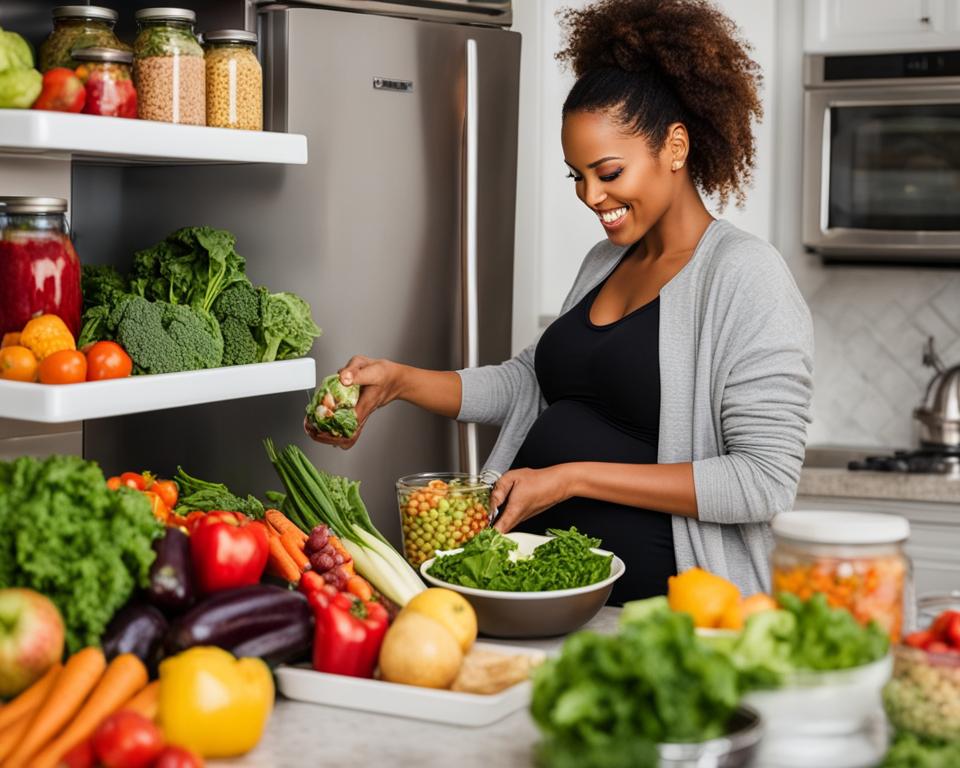
By following these tips, you can successfully create a healthy pregnancy meal plan that provides you and your baby with the necessary nutrients for a thriving pregnancy. Prioritize a balanced mix of foods, plan for snacks, and incorporate batch cooking and pantry stocking into your routine. Remember, always consult with your healthcare provider or a registered dietitian to ensure your meal plan aligns with your specific dietary needs and medical conditions.
7 Days of Healthy Pregnancy Meal Plan
Here is a sample 7-day meal plan that provides an optimum balance of nutrients for a healthy pregnancy. The plan includes a variety of recipes for breakfast, lunch, and dinner, as well as suggestions for snacks. It features meals such as overnight oats, grilled tomato basil pizza, and sesame chicken salad. These meals are designed to support your baby’s growth and development while ensuring you’re properly nourished throughout the day.
| Day | Breakfast | Lunch | Dinner | Snacks |
|---|---|---|---|---|
| Day 1 | Scrambled eggs with spinach and whole wheat toast | Quinoa salad with grilled chicken | Salmon with roasted vegetables and quinoa | Cucumber slices with hummus |
| Day 2 | Greek yogurt with berries and granola | Black bean and sweet potato burrito | Grilled tomato basil pizza | Apple slices with almond butter |
| Day 3 | Berry smoothie with spinach | Vegetable stir-fry with tofu | Turkey meatballs with whole wheat pasta | Carrot sticks with ranch dressing |
| Day 4 | Oatmeal with banana and walnuts | Sesame chicken salad | Beef stir-fry with brown rice | Trail mix with dried fruit and nuts |
| Day 5 | Whole grain pancakes with berries | Caprese sandwich with whole wheat bread | Grilled lemon herb chicken with quinoa | Yogurt with mixed nuts and seeds |
| Day 6 | Avocado toast with smoked salmon | Spinach and feta stuffed chicken breast | Vegetable and lentil curry with brown rice | Sliced bell peppers with guacamole |
| Day 7 | Overnight oats with chia seeds and mixed nuts | Shrimp and quinoa salad | Veggie-packed turkey chili | Greek yogurt with honey and berries |
Benefits of Meal Prepping During Pregnancy
Meal prepping during pregnancy comes with numerous advantages that can support your health and wellbeing. By taking the time to plan and prepare meals in advance, you can enjoy the following benefits:
- Time and Effort Saving: With a busy schedule, meal prepping allows you to save time and effort by cooking and storing meals ahead of time. This ensures that you always have nutritious options available, even when you’re short on time or energy.
- Healthier Eating Habits: Meal prepping promotes healthier eating habits by allowing you to make intentional food choices. When you have pre-prepared meals ready to go, you’re less likely to rely on unhealthy convenience foods or order takeout, making it easier to stick to a well-balanced diet.
- Reduced Stress: The stress of deciding what to cook for each meal can be overwhelming during pregnancy. Meal prepping eliminates this stress by providing you with a clear plan and alleviating the need to make last-minute decisions about what to eat.
- Financial Savings: When you meal prep, you can buy ingredients in bulk and take advantage of sales, reducing your grocery bill. Additionally, planning and preparing meals in advance helps minimize food waste, saving you money in the long run.
By incorporating meal prepping into your routine, you can streamline your mealtime experience, ensure a consistent intake of nutritious foods, and reduce unnecessary stress during pregnancy. It’s a simple yet effective strategy that allows you to prioritize your health and the health of your baby.
Expert Tip:
Meal prepping doesn’t have to be overwhelming. Start by selecting a few simple recipes and set aside a specific time each week to plan, shop, and prepare your meals. Gradually increase your repertoire as you become more comfortable with the process.
| Benefits of Meal Prepping During Pregnancy |
|---|
| Time and Effort Saving |
| Healthier Eating Habits |
| Reduced Stress |
| Financial Savings |
Importance of Whole Foods in Pregnancy Nutrition
When it comes to pregnancy nutrition, whole foods play a crucial role in providing you and your baby with the essential nutrients needed for a healthy pregnancy journey. Whole foods are unprocessed or minimally processed foods that retain their natural nutritional value. Unlike processed foods that often contain added sugars, unhealthy fats, and artificial ingredients, whole foods offer a wide range of benefits.
Whole foods are rich in vitamins, minerals, fiber, and antioxidants that are vital for your baby’s development. These nutrients support healthy growth, brain development, and overall well-being during pregnancy. By incorporating whole foods into your meals, you can provide your body with a sustainable source of energy and promote a balanced diet.
One of the key benefits of whole foods during pregnancy is their ability to help prevent excessive weight gain. Processed foods often contain empty calories and lack the essential nutrients needed to support a healthy pregnancy. By choosing whole foods, you can satisfy your hunger with nutrient-dense options that nourish your body and support optimal weight management.
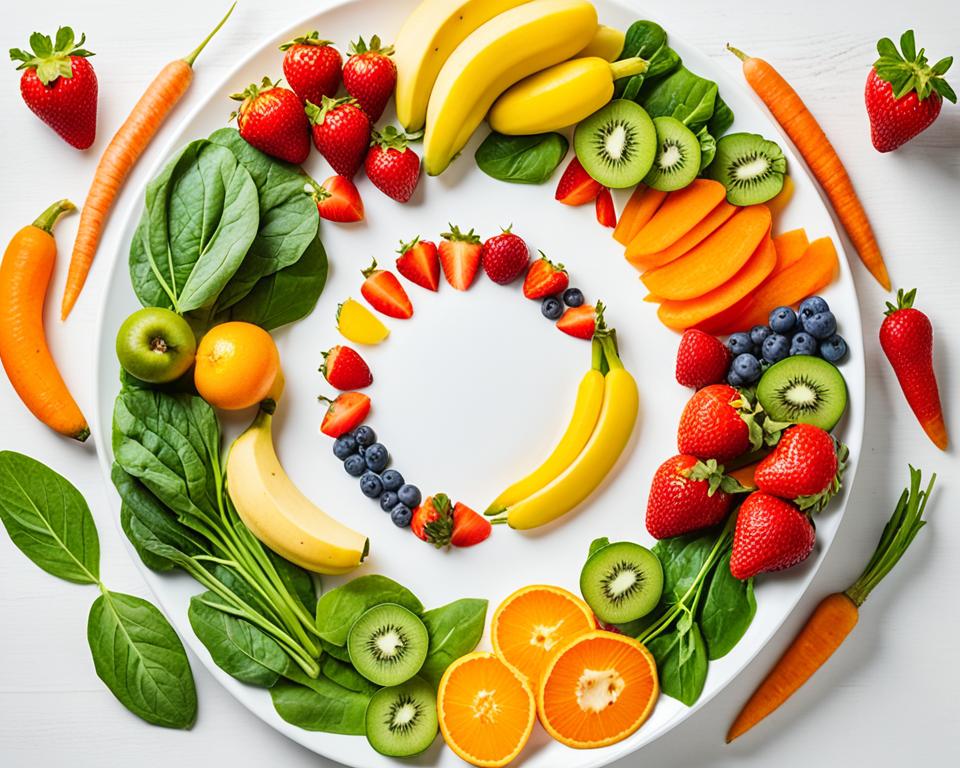
Whole foods also offer unique advantages over supplements. While prenatal supplements are important for filling nutritional gaps, whole foods provide a wide array of nutrients that work synergistically to support your health and that of your baby. For example, oranges not only provide vitamin C but also contain fiber and other beneficial phytochemicals that are not found in vitamin C tablets alone.
Incorporating whole foods into your meals can be as simple as including fruits, vegetables, whole grains, lean proteins, and healthy fats in your daily diet. Opt for fresh, seasonal produce, and choose organic options whenever possible to reduce exposure to pesticides and other harmful chemicals.
If you’re unsure which whole foods to include in your pregnancy diet or need some inspiration, here are a few examples:
- Leafy green vegetables like spinach, kale, and Swiss chard
- Fruits such as berries, oranges, and apples
- Whole grains like quinoa, brown rice, and oats
- Lean proteins like chicken, turkey, and tofu
- Healthy fats like avocado, nuts, and seeds
By incorporating these whole foods into your meals, you can ensure that you and your baby receive the necessary nutrients for a healthy pregnancy. Remember to consult with your healthcare provider for personalized guidance on your specific dietary needs during pregnancy.
Conclusion
Maintaining a healthy lunch routine during pregnancy is essential for supporting the growth and development of your baby. By incorporating a variety of nutrient-rich foods into your meals and focusing on whole foods, you can ensure that you and your baby receive the necessary nutrients. Following a meal plan can also help you stay organized and make healthier choices.
It’s important to prioritize your overall well-being during pregnancy, which includes staying hydrated. Drinking enough water throughout the day can prevent dehydration and promote optimal health for both you and your baby.
With these delicious and nutritious lunch recipes, you can enjoy a healthy and fulfilling pregnancy journey. Remember to consult with your healthcare provider for personalized guidance and recommendations. Take care of yourself and embrace this special time in your life by nourishing your body with the right foods.
FAQ
What are some nutritious lunch foods for pregnant women?
Some nutritious lunch foods for pregnant women include salads with lean protein, soups, sandwiches made with whole grains and lean proteins, and smoothie bowls loaded with protein and calcium-rich ingredients.
How important is lunch during pregnancy?
Lunch is important during pregnancy as it provides an opportunity to fuel your body and provide essential nutrients for your baby’s development. It also offers a moment of calm and relaxation in your busy day.
What are some tips for healthy pregnancy lunches?
Some tips for healthy pregnancy lunches include consuming a good dose of protein and fiber to keep you full and energized, opting for whole foods, and avoiding saturated fats and deep-fried menu items. It’s also important to stay hydrated by drinking enough water throughout the day.
What is the importance of meal planning during pregnancy?
Meal planning during pregnancy ensures you and your baby receive the necessary nutrients. It helps you incorporate a variety of nutritious foods into your diet, reduces the risk of nutrient deficiencies, and supports healthy fetal development. Meal planning also saves time, reduces stress, and promotes healthier eating habits.
How can I create a healthy pregnancy meal plan?
To create a healthy pregnancy meal plan, consider your individual calorie and nutrient needs. Use tools like the USDA’s MyPlate Plan to determine your daily caloric needs and customize your eating plan. Prioritize balanced meals that include lean proteins, healthy fats, whole grains, fruits, and vegetables. Don’t forget to plan for snacks and focus on drinking enough water throughout the day.
Can you provide a sample 7-day meal plan for pregnancy?
Sure! Here is a sample 7-day meal plan for a healthy pregnancy:
– Breakfast: Overnight Oats with Mixed Berries
– Lunch: Grilled Tomato Basil Pizza with Side Salad
– Dinner: Sesame Chicken Salad with Brown Rice
– Snack: Greek Yogurt with Fresh Fruit
Repeat for the remaining days, incorporating different recipes to keep your meals exciting and nutritious.
What are the benefits of meal prepping during pregnancy?
Meal prepping during pregnancy saves time and effort by preparing meals in advance, ensures you have healthy options readily available, helps make better food choices, reduces stress around mealtime, and promotes healthier eating habits. Additionally, meal prepping can save money by minimizing food waste and reducing the temptation to order takeout or eat convenience foods.
Why are whole foods important in pregnancy nutrition?
Whole foods are important in pregnancy nutrition as they provide essential nutrients, including vitamins, minerals, fiber, and antioxidants, which are vital for your baby’s development. They offer a more sustainable source of energy and can help prevent excessive weight gain during pregnancy. Incorporating whole foods into your meals supports your overall well-being and promotes a healthy pregnancy.
What is the summary of healthy lunch recipes for pregnancy?
Maintaining a healthy lunch routine during pregnancy is crucial for supporting your baby’s growth and development. By incorporating a variety of nutrient-rich foods into your meals, focusing on whole foods, and following a meal plan, you can ensure you and your baby receive the necessary nutrients. Additionally, don’t forget to stay hydrated and prioritize your overall well-being.

